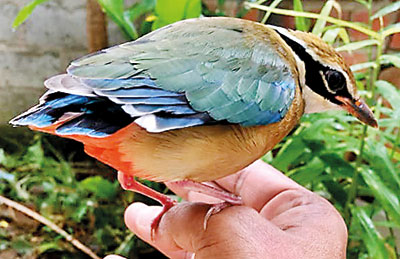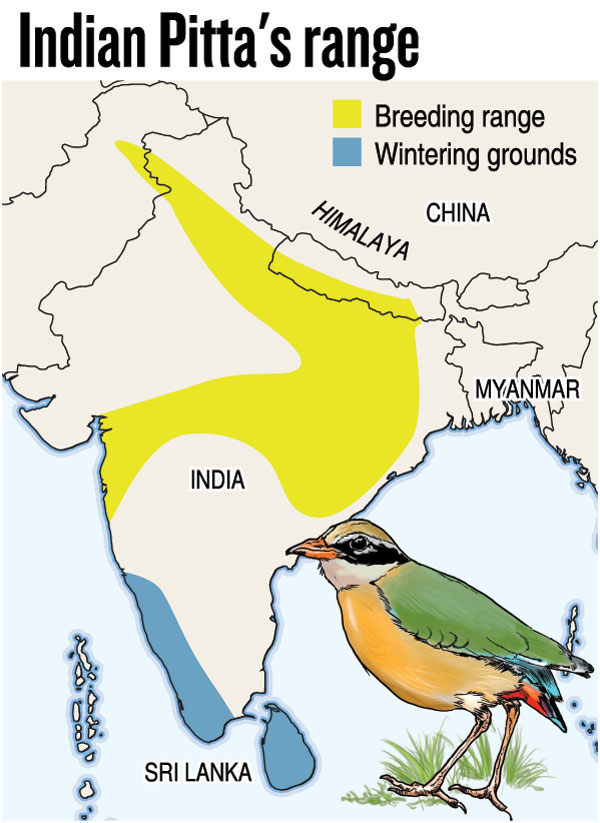News
Look out for exhausted Pittas
View(s):By Malaka Rodrigo
As the southernmost landmass along the Central Asian Flyway for migratory birds, Sri Lanka attracts over 200 winter visitors, who start arriving from the end of August. Many of the migrants are already here but bird lovers are on the watch out for that special migrant in October.
“The Indian Pitta, known as avichchiya in Sinhala, is one of the migratory birds that arrives in October, particularly in the second half of the month,” says ornithologist Jagath Gunawardena.

Indian Pitta found in a home garden. Pic by Sarath N. Senanayake
Being a relatively large bird, the Indian Pitta can become exhausted after long flights, leading to disorientation. As a result, these birds are often found in home gardens and even indoors during their initial arrival. This leaves them vulnerable to predations, especially domestic cats and aggressive birds like crows.
“During October and November, many wounded or exhausted birds are brought to the Wild Animal Rescue Centre in Attidiya, which is managed by the Department of Wildlife Conservation (DWC),” says veterina ry surgeon Dr. Suhada Gunawardena. If you encounter an exhausted Indian Pitta, start by inspecting it for any broken wings or wounds. In such cases, you can contact the DWC hotline at +94 11 2 888 585 for assistance.
If the bird appears healthy, keep it in a dark, quiet and warm location, safe from predators. If it seems weak, you can offer small amounts of low-concentration glucose saline with Vitamin C if it is conscious. If the bird is able to fly, release it in a safe environment, ideally at sunrise, says Dr. Gunawardena. He empahsised the importance of handling birds gently to avoid injury. “Never hold a bird by its wings, legs, or tail, as this can cause serious harm,” he cautions.
The Indian Pitta is native to northern India and typically remains in Sri Lanka until April. It is often referred to as the “Six o’clock” bird due to its habit of calling at sunrise and sunset. Some Indian Pittas tend to call more frequently before leaving their winter territories, leading some people to believe they arrive in April during the Avurudu season,” adds Dr. Gunawardena. Last Saturday, October 12 was International Migratory Bird Day for Sri Lanka and countries in the Southern hemisphere. The theme this year was “Protect Insects, Protect Birds”, highlighting the importance of insects particularly for migratory birds and concerns on the decreasing populations of insects.
The Field Ornithology Group (FOGSL), based at the University of Colombo also launched a citizen science programme, “Neighbourhood Migrant Bird Watch” inviting the public to share interesting observations of migratory birds through email arrivingmigrantssurvey@gmail.com.

The best way to say that you found the home of your dreams is by finding it on Hitad.lk. We have listings for apartments for sale or rent in Sri Lanka, no matter what locale you're looking for! Whether you live in Colombo, Galle, Kandy, Matara, Jaffna and more - we've got them all!

